
Topics
Guests
- Naomi Kleinis a journalist and best-selling author. Her most recent book is This Changes Everything: Capitalism vs. the Climate. She narrates the documentary film based on the book.
- Avi Lewisis the director and producer of the documentary film, This Changes Everything. He was previously a host for the Al Jazeera show Fault Lines.
South Carolina Governor Nikki Haley is calling this weekend’s torrential rainfall that has triggered flooding and led to eight deaths in the Carolinas a once-in-a-millennium downpour. According to the National Weather Service, the storm had dumped more than 20 inches of rain in parts of central South Carolina since Friday. This month also marks the third anniversary of Superstorm Sandy, one of the most destructive storms in the nation’s history. Researchers say such extreme weather events are becoming more frequent with the effects of climate change, with 2015 on track to be the hottest year in recorded history. In Part Two of our conversation with Naomi Klein and Avi Lewis on their new film, “This Changes Everything,” we talk about what we can learn from such extreme weather events.
Transcript
AMY GOODMAN: We move on to the dramatic news of what has taken place in this country over the last week, a once-in-a-millennium downpour. That’s what South Carolina Governor Nikki Haley is calling the torrential rainfall that’s triggered massive flooding over the weekend. At least eight people have died in the Carolinas. This is South Carolina Governor Haley.
GOV. NIKKI HALEY: When you think about what we’re sitting in right now, we are at a thousand-year level of rain in parts of the Lowcountry. What does that mean? We haven’t seen this level of rain in the Lowcountry in a thousand years. That’s how big this is. That’s how South Carolina is—what South Carolina is dealing with right now. The Congaree River is at its highest level since 1936.
AMY GOODMAN: According to the National Weather Service, the storm had dumped more than 20 inches of rain in parts of central South Carolina since Friday. Researchers say extreme weather events are becoming more frequent with the effects of climate change. The year 2015 is on track to be the hottest in recorded history. Scientists at the National Oceanic and Atmospheric Administration recently released a report showing July was the single warmest month in history, and nine of the 10 hottest months since record keeping began in 1880 have occurred since 2005.
Well, we’re going to spend the remainder of the hour bringing you Part Two of our conversation with Naomi Klein and Avi Lewis on their remarkable new film that re-imagines the vast challenge of climate change. The film is called This Changes Everything. It’s based on Naomi Klein’s global best-seller, This Changes Everything: Capitalism vs. the Climate. And, yes, we dare to say what the meteorologists over the weekend, all the news reports, 24 hours a day, that are certainly dealing with this once-in-a-thousand-year flood in South Carolina, don’t mention: the words “climate change.” I began by asking Naomi Klein and Avi Lewis about extreme weather events like Hurricane Sandy, which hit three years ago this month. This is a clip from their film, followed by Avi Lewis and Naomi Klein.
NAOMI KLEIN: But a strange thing happened as the fossil fuel economy spread over the world: The sacrifice zone got bigger and bigger. It started with the places considered the middle of nowhere. And then, one day, I watched it come to the place that sees itself as the center of everywhere.
REPORTER: This was the moment when Sandy struck, 90-mile-an-hour winds slicing through New York’s streets. Three-quarters of a million people have been forced to evacuate.
NAOMI KLEIN: All those years, we imagined that we had freed ourselves from nature’s bonds, that we were the boss. There was a part of the story we couldn’t yet see: Our machines were filling the atmosphere with greenhouse gases. Could it be that we’re not the masters, after all, that we are just guests here and that we can get evicted for bad behavior?
AMY GOODMAN: What we just came out of, this clip on Superstorm Sandy, what it teaches us now?
AVI LEWIS: Well, you know, it’s—we were here in New York a week after the film—after the storm. Obviously, you guys lived right through it. I watched your broadcasts in those days, and it was staggering. And I think now that—everyone gets triggered with post-traumatic stress about these terrible, terrible climate-driven disasters. And I think there are fewer and fewer parts of the world where people don’t hear the warnings and relive the last disaster, because this is a crisis of the now. And I think New Yorkers really are in a state of returning, you know, having flashbacks to that. We need to harness that fear and that trauma, and actually turn it into healing and positive change.
AMY GOODMAN: Blockadia, the grassroots movements around the world that are standing up to the fossil fuel companies, talk about this global phenomenon that the corporate media rarely covers, let alone links.
AVI LEWIS: Well, it’s been an extraordinary few years for the climate justice movement. I mean, to be here in New York in the fall is very emotional for us, because we were on the streets with almost half a million people in the People’s Climate March. And what made that moment so extraordinary was the diversity and the connecting-the-dots feeling of the movement these days. You have front-line communities, whether on the front lines of fossil fuel extraction or on the front lines of pollution, and, you know, marginalized communities. We know that the impacts of climate change and industrialization are racialized. The people of economic—without economic means are much more vulnerable. And you see these communities coming together and connecting causes and naming the system at the heart of it. It’s happening around the world.
And what’s really exciting nowadays, I think, is that we’re starting to see not just the no to these damaging projects and to this logic of extraction—extraction of wealth as well as extraction of resources—but we’re seeing more and more of the yes. So look at the divestment movement, which has exploded in three years, $1.2 trillion in capital now—
NAOMI KLEIN: Four-point-six.
AVI LEWIS: How much?
NAOMI KLEIN: Four-point-six trillion.
AVI LEWIS: Four-point-six trillion dollars in capital which is committed to divesting from fossil fuel investments. But it’s not just the no to the fossil fuel stocks and bonds. It’s the yes in terms of redirecting and reinvesting that money in community cooperatives, in renewable energy. And we’re seeing this, and we see it throughout the film, the communities on the front lines of the no—
AMY GOODMAN: Explain those communities that you cover.
AVI LEWIS: Well, so, we went—so, for instance, we went to northern Greece in the middle of this horrific economic assault, you know, of the austerity being imposed on Greece, which is being used as an excuse to open up all these new dirty projects. They’re talking about drilling for oil in the Aegean and Ionian seas, some of the most storied oceans in history. And there’s this massive gold mine proposed and starting to be developed by a Canadian company in a very beautiful area of northern Greece. And there’s this extraordinary community resistance to it, people in a fairly conservative part of the world, who are not activists, who are not lefties, who start to see what’s being done in the name of this economic model and the excuse this brings—
AMY GOODMAN: It fits very much in with your previous book, The Shock Doctrine: The Rise of Disaster Capitalism, Naomi.
NAOMI KLEIN: Well, I mean, the truth is, I see this book and this project as a sequel to The Shock Doctrine, because that book begins and ends with Hurricane Katrina. And what we are seeing is what climate change looks like when you have an economic system that systematically fuels inequality, ever wider inequality, often along racial lines. And we know what it looks like. It looks like Katrina. Right? I mean, if you had money and resources, you were able to get out of the city, call your insurance company. But if you needed a functional state, you were out of luck, first of all because the levees were neglected, second of all because there was no evacuation, there was—you know, FEMA couldn’t find the Superdome for five days. I mean, you know the story. But then, what happened next, right? The disaster-capitalism complex, as I called it in that book, descends on the city to privatize the school system, to get rid of public housing and replace it with condominiums, you know, to decide not to open Charity Hospital that serves the city’s poor.
So, this book is an attempt to think about how do we respond to crisis collectively in a way that reduces inequality, that builds a fairer society, that is democratic instead of this incredibly antidemocratic process that I described in The Shock Doctrine. And look, you know, climate change is the biggest shock of all. It hits us with shock after shock after shock, whether it’s a hurricane, whether it’s the endless drought in California. And, you know, Amy, I was really—you know, it takes a lot to shock me, because I’ve been immersed in this stuff for a long time. But I didn’t realize that a third of California’s firefighters are prison inmates, being paid $2 an hour to fight California’s—yeah, and for CAL FIRE, it’s apparently half of the firefighters. So this is incredibly dangerous work. They’re being paid $2 an hour, or—and if they’re not actively fighting fires, some of them are being paid less than $2 a day. And it turns out that there are forces in California that are resisting prison reform measures that would lower California’s prison population, because they’re worried about the impact of their firefighter supply.
This is what it looks like to try to deal with climate change within an economic context of what around the world is called neoliberalism, relentless austerity, which—you know, one of the impacts of relentless austerity is increased incarceration, locking up and locking out the people who are losing within this economic system. So, that’s why we’re calling for looking at the root causes of what is driving climate change, and also using climate change as a catalyst to build a fairer economic system. And what we show in the film is that people are doing this very organically. As they’re fighting the fossil fuel projects, they’re fighting for energy democracy, community-controlled renewable energy, that keeps resources in the community so they can pay for services.
AMY GOODMAN: Naomi, you mentioned that part of the crisis in Syria is caused by climate change. Explain.
NAOMI KLEIN: Well, what we know is that Syria, right before the civil war broke out, had the worst drought in its history, a record-breaking drought. And obviously there are multiple drivers for any conflict, just as there are multiple drivers for any storm. It’s not like you can say this is just because of climate change. But what we do know is that climate change loads the dice, right? It’s an accelerant. So the storm would happen anyway, but because water is warmer, the storm is stronger. Well, climate change is an accelerant on many different levels. So you have conflicts and tensions already, fueled by military intervention, fueled by support for dictatorship. But then, when you layer on top a drought and the fact that people move, and more and more people crowd into cities, and that causes more conflict. So it’s not, you know, a direct causal this—you know, X causes Y. It’s another layer fueling it.
AMY GOODMAN: What about the pope coming to town? He’s left the building now. The pope is no longer in the United States. But he gave the first address a pope has ever given to a joint session of Congress. Before the pope came here, he was in Cuba. Before that, you were at the Vatican. You were invited to address his unprecedented encyclical on climate change and the environment.
NAOMI KLEIN: Mm-hmm.
AMY GOODMAN: What about his message here?
NAOMI KLEIN: Well, I think, first of all, this reflects the fact that the climate movement, and specifically the climate justice movement, is growing. And it’s growing in different constituencies. And the faith community is really, really a major part of this movement.
You know, as I’ve said before, I think, in earlier discussions we’ve had, one of the things that’s most remarkable about the encyclical is the way that it challenges dominant—this idea that humans have a right to dominate nature, that everything in nature is just here to serve us. I think what’s really most bold about the document is the way it celebrates interconnection, that we are all a part of this complex system, and that nature has inherent rights. I mean, this is something that the pope said when he addressed the U.N., which is—I don’t know if people understand quite how remarkable that is, because just a few years ago, before Pope Francis, under Benedict, the Holy See, which is—you know, actually has negotiating status at the United Nations as a country, would try to get references to the rights of nature and Mother Earth taken out of negotiating texts when countries like Bolivia and Ecuador would put them in, because they didn’t like this idea of natural rights, of nature having inherent value, because they were still subscribing, to some degree, to this idea of dominion. So there’s a major shift.
And look, I certainly don’t agree with the Vatican on everything. In fact, we could go through a very, very long list, which I won’t go—won’t bore you with right now. But what I find most remarkable about this pope is he is a man in a hurry. You know, you think about this trip in the U.S. and all of the speeches he made. He’s addressing Congress. He’s on the balcony. He’s talking to the homeless. He’s zipping to New York. I mean, how—and it’s dizzying, and it really—this is what leadership looks like as if the world depended on it. You don’t have to agree with him on everything, but the urgency of this political moment, the fact that we are on such a tight science-based deadline, the fact that it matters so much what we do in the next five years. I think from Obama we’ve seen what it looks like as if your legacy depends on it. But we need to see leadership as if the world depended on it.
AMY GOODMAN: And—
AVI LEWIS: And just what about the resonance that this message is having? I mean, I, as a Canadian, you know, to be in the States right now and see the unbelievable support for Bernie Sanders and the enthusiasm for someone who’s talking about inequality, relentlessly talking about inequality, and connecting it to climate change, which, of course, is central to the pope’s message, too. These two intertwining crises are the defining crises of our time. And these two old guys, who are talking about it in very blunt ways, are summoning massive crowds and real resonance. And yet, you know, obviously, the mainstream media has no interest in connecting these topics or even really addressing them. But the popular support and resonance is just astonishing.
AMY GOODMAN: Filmmaker Avi Lewis and author Naomi Klein on their new film, This Changes Everything. When we come back, we talk to them about The Leap Manifesto, Canada’s upcoming elections, and Shell saying they won’t be drilling in the Arctic. Stay with us.

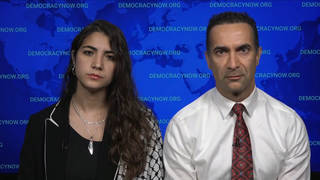
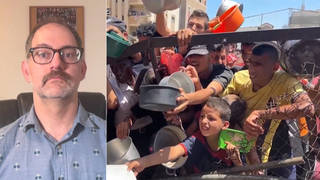
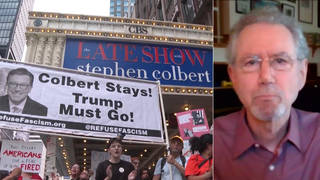
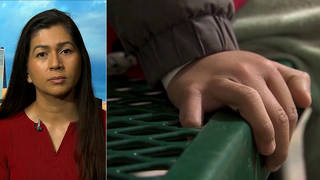







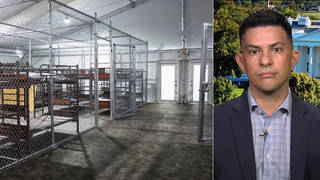
Media Options